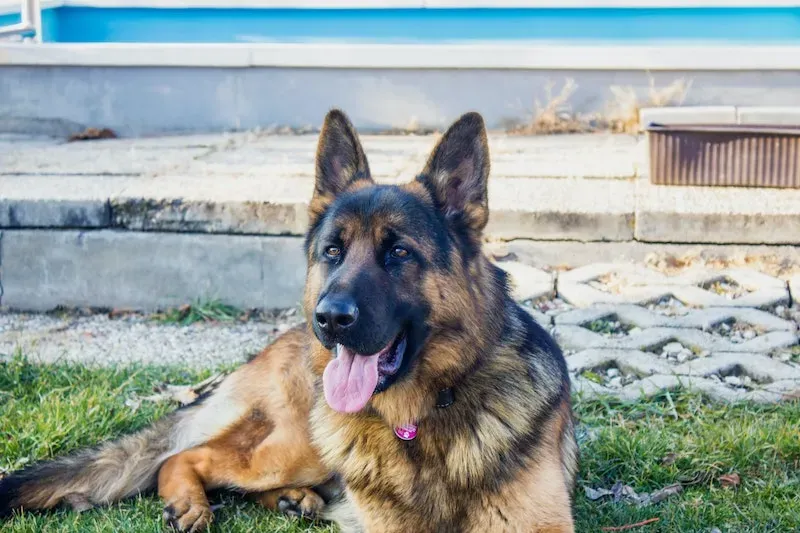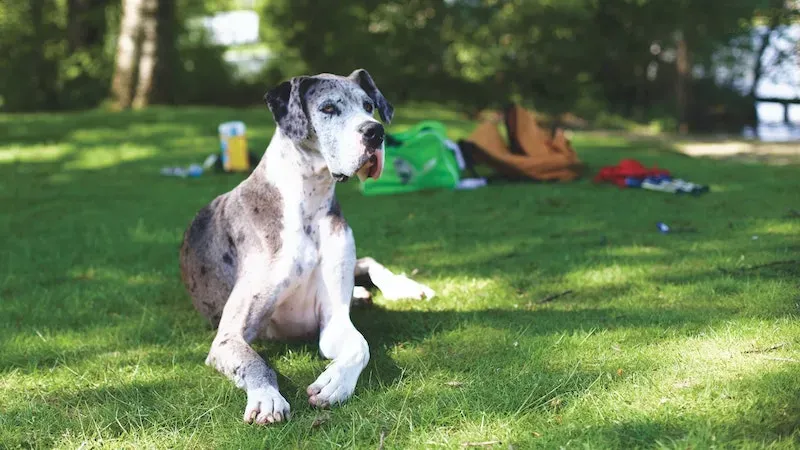Service dogs play an increasingly vital role in supporting individuals facing mental health challenges. Among them, PTSD service dogs offer invaluable comfort and assistance. While any dog can be trained to provide this support, certain breeds possess inherent traits that make them exceptionally well-suited for the task. These dogs often exhibit calm temperaments and a natural aptitude for training, making them ideal companions for individuals navigating the complexities of PTSD and anxiety.
What Makes a Breed Ideal for PTSD and Anxiety Service?
When considering the Best Service Dog Breeds For Ptsd And Anxiety, several factors come into play. Intelligence, trainability, a calm demeanor, and a strong bond with their handler are all crucial. Certain breeds consistently demonstrate these qualities, making them more likely to succeed in the demanding role of a service dog.
Understanding PTSD Service Dogs
A PTSD service dog is a specially trained assistance animal that performs specific tasks to aid individuals coping with post-traumatic stress disorder. Unlike emotional support animals (ESAs), service dogs undergo rigorous training to mitigate the impact of PTSD symptoms. They might be trained to recognize signs of anxiety, interrupt flashbacks, provide tactile stimulation to ground their handler, or even create a safe perimeter in public spaces.
According to the CDC, approximately 61 million Americans live with a disability. As of 2016, around 500,000 service dogs were assisting them, and this number is likely higher now. These dogs offer a sense of security, reduce reliance on medication, and promote independence, ultimately improving the quality of life for their handlers.
The Americans with Disabilities Act (ADA) grants service dog owners specific rights, including access to public spaces, air travel, and housing, regardless of pet restrictions. This legal protection offers a crucial layer of support and reduces potential stressors for individuals with PTSD.
Let’s explore some of the best service dog breeds for PTSD and anxiety, each with unique qualities that make them exceptional partners in healing.
Top 8 Breeds to Consider for PTSD and Anxiety Service Dogs
When selecting a service dog for PTSD and anxiety, consider each breed’s unique strengths and how they align with your specific needs and lifestyle.
1. Golden Retriever
 Golden retrievers are popular as both service dogs and regular pets because they are friendly and easy to get along with. But don't let that fool you; they're also very hard workers. A high intellect makes these dogs very willing and easy to train.
Golden retrievers are popular as both service dogs and regular pets because they are friendly and easy to get along with. But don't let that fool you; they're also very hard workers. A high intellect makes these dogs very willing and easy to train.
Golden Retrievers are renowned for their gentle nature, unwavering loyalty, and eagerness to please. Their intelligence and trainability make them ideal candidates for service dog work. Golden Retrievers possess an innate ability to sense emotional distress and offer comfort, making them invaluable companions for those with PTSD and anxiety. Their friendly demeanor also helps to reduce social anxiety in public settings. However, prospective owners should be aware of their shedding tendencies, which may require regular grooming.
2. Labrador Retriever
 Labrador Retrievers are similar to Golden Retrievers in many ways and have similar benefits. These dogs form strong bonds with their owners, which is an important trait in a PTSD service dog. They like to feel useful and help people, and they are especially good at helping people move around.
Labrador Retrievers are similar to Golden Retrievers in many ways and have similar benefits. These dogs form strong bonds with their owners, which is an important trait in a PTSD service dog. They like to feel useful and help people, and they are especially good at helping people move around.
Similar to Golden Retrievers, Labrador Retrievers are intelligent, affectionate, and highly trainable. They excel at forming strong bonds with their handlers and possess a natural empathy that makes them excellent emotional support animals. Labradors are particularly adept at retrieving medication or other essential items, providing a tangible form of assistance for individuals struggling with daily tasks. Their patience and calm demeanor are particularly beneficial for those experiencing heightened anxiety. Like Golden Retrievers, they are also moderate shedders. These dogs form strong bonds with their owners, which is an important trait in a best dog breed for anxiety service dog.
3. German Shepherd
 German Shepherds are often used as emotional support dogs. They are also often used in the military, which could provide some familiarity but could also be seen as a drawback—a link to memories that would be better forgotten.
German Shepherds are often used as emotional support dogs. They are also often used in the military, which could provide some familiarity but could also be seen as a drawback—a link to memories that would be better forgotten.
German Shepherds are intelligent, courageous, and highly protective, making them excellent service dogs for individuals who require a strong sense of security. They are naturally alert and can be trained to identify potential threats or triggers, providing a proactive layer of support. German Shepherds are also highly adaptable and can learn a wide range of tasks, making them versatile partners for those with complex needs. However, their protective instincts require careful training to ensure they respond appropriately in various situations.
4. Poodle
 Poodles are one of those breeds that people don't commonly associate with being service dogs, but poodles make an excellent PTSD service dog. They're capable of learning intricate tasks as well as having a strong sense of smell.
Poodles are one of those breeds that people don't commonly associate with being service dogs, but poodles make an excellent PTSD service dog. They're capable of learning intricate tasks as well as having a strong sense of smell.
Poodles are highly intelligent, hypoallergenic (low-shedding), and eager to please, making them a versatile choice for service dog work. Their intelligence allows them to learn complex tasks quickly, while their hypoallergenic coat makes them suitable for individuals with allergies. Standard Poodles are the preferred size for service work, as they possess the strength and stamina to perform various tasks. Their sensitive nature also allows them to attune to their handler’s emotional state, providing timely comfort and support.
5. Border Collie
 Due to a high level of intelligence, border collies are often used as show dogs. They are easy to train and willing to work, which makes them great PTSD service dogs. Border Collies have a very friendly and outgoing personality, making them ideal for supporting people with mental health challenges.
Due to a high level of intelligence, border collies are often used as show dogs. They are easy to train and willing to work, which makes them great PTSD service dogs. Border Collies have a very friendly and outgoing personality, making them ideal for supporting people with mental health challenges.
Border Collies are known for their exceptional intelligence, boundless energy, and unwavering focus. Their trainability is unparalleled, making them capable of learning a wide range of tasks. They thrive on having a job to do and are happiest when working alongside their handler. However, their high energy levels require consistent exercise and mental stimulation to prevent behavioral issues. Proper obedience training is essential for this breed. This makes them excellent as a best breed for anxiety service dog.
6. Pomeranian
 Like poodles, Pomeranians are small dogs. Even though they aren't big enough to help with physical tasks, their stature can be an advantage if you're going to be flying a lot. It's also useful when you don't have much space at home.
Like poodles, Pomeranians are small dogs. Even though they aren't big enough to help with physical tasks, their stature can be an advantage if you're going to be flying a lot. It's also useful when you don't have much space at home.
Pomeranians, despite their small size, possess a big heart and a keen awareness of their owner’s emotions. Their alert nature and strong bond with their handlers make them excellent companions for individuals seeking emotional support and a sense of security. While they may not be able to perform physical tasks, their presence alone can be incredibly comforting. Their small size also makes them well-suited for apartment living and air travel.
7. Great Dane
 Great Danes are, of course, incredibly strong, making them a valuable support animal for many. They're also great emotional support dogs for this same reason, and. despite their intimidating stature, this breed is very loving and becomes easily attached to their owners. They're also well-behaved in public spaces and don't get riled up easily, maintaining a calm disposition by default.
Great Danes are, of course, incredibly strong, making them a valuable support animal for many. They're also great emotional support dogs for this same reason, and. despite their intimidating stature, this breed is very loving and becomes easily attached to their owners. They're also well-behaved in public spaces and don't get riled up easily, maintaining a calm disposition by default.
Great Danes are gentle giants known for their affectionate nature and calm demeanor. Despite their imposing size, they are surprisingly gentle and sensitive, making them excellent emotional support animals. Their presence can provide a sense of security and comfort, while their calm temperament helps to reduce anxiety in public settings. However, their size may not be suitable for all living situations.
8. Bernese Mountain Dog
 Bernese Mountain Dogs are just stunning creatures, and they're also ideal as PTSD service dogs. This breed is incredibly strong and fiercely intelligent, yet also very loving toward their owners. Its intelligence also makes learning complex tasks a breeze, the key to acquiring a PSD that can tend to mental health needs quickly.
Bernese Mountain Dogs are just stunning creatures, and they're also ideal as PTSD service dogs. This breed is incredibly strong and fiercely intelligent, yet also very loving toward their owners. Its intelligence also makes learning complex tasks a breeze, the key to acquiring a PSD that can tend to mental health needs quickly.
Bernese Mountain Dogs are loyal, intelligent, and eager to please, making them excellent candidates for PTSD service dog work. They are known for their gentle nature and strong bond with their handlers. Their intelligence allows them to learn complex tasks, while their calm demeanor provides a soothing presence for those experiencing anxiety. However, they require regular grooming and can be prone to certain health issues.
Key Traits of an Effective PTSD Service Dog
Beyond breed-specific traits, certain qualities are essential for any dog performing PTSD service work.
- Easygoing Nature: A service dog must remain calm and composed in public settings, even in crowded or noisy environments. They should not exhibit aggressive or overly protective behaviors.
- Strong Work Ethic: A service dog should be eager to learn and perform tasks, demonstrating a willingness to work alongside their handler.
- Deep Bond with Owner: A strong, loving bond between the dog and handler is crucial for effective support and emotional connection. Choosing a loving breed will ensure that they’re always there to lean on. You can also check best small dog breeds for emotional support.
The Role of an ESA Letter
While not required for service dogs, an ESA letter may be beneficial in certain situations, such as securing housing in pet-restricted environments. It’s important to understand the distinction between service dogs and ESAs and the legal rights associated with each. A legitimate ESA Letter states your right to an emotional support animal.
Conclusion: Finding the Right Partner
Choosing a best breed of dog for service animal is a significant decision that requires careful consideration. While certain breeds possess inherent advantages, the most important factor is the individual dog’s temperament, trainability, and bond with their handler. By carefully evaluating your needs and lifestyle, you can find the perfect canine partner to support your journey toward healing and well-being. You should also consider the types of dogs for service dogs to help make the right decision.
